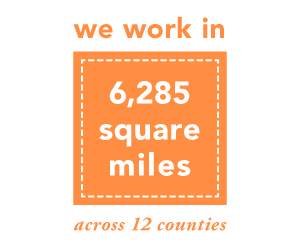The Finger Lakes Land Trust accepted the donation of a conservation easement protecting 158 acres in Ontario County from landowners Dale and Glen Shaw. Located on State Route 21 and Dugway Road, between Canandaigua and Honeoye lakes, the property is situated in the towns of Bristol, Canandaigua, and South Bristol.
Containing woodlands, meadows, crop fields, and a small vineyard, the property has been managed by Dale’s family since it was first purchased in the 1940s. When it was time for her parents to retire, Dale took over operations at the farm where she has lived her entire life. She is the third generation to live and work on the Ontario County property, a cherished way of life she shares with her husband Glen.

Photo: Tony Russo
Dale and Glen mainly grow Concord and Niagara grapes which they sell to Welch’s for grape juice and to Randall Standish Vineyards in Canandaigua. They also grow Catawba and Noreit varieties. “The land has always been our first priority,” said Dale. “It’s nice to know that it’s still going to be here after I’m gone.”
In addition to the vineyards, forest, and croplands, the easement will safeguard more than 4,000 feet of frontage on two tributaries to a stream that flows into Canandaigua Lake, benefitting a public drinking water supply serving approximately 70,000 area residents.
With this latest easement, an uninterrupted corridor of conservation land extends from State Route 21 to State Route 64. The Shaw’s land borders a neighboring parcel the FLLT recently acquired and intends to transfer to New York State as an addition to Stid Hill Wildlife Management Area.
Transaction and stewardship costs associated with the project were covered by a grant from The Nature Conservancy’s Resilient and Connected Grant Program, which supports the protection of lands and waters that provide linkages for climate change-driven wildlife migration.
“Tackling climate change’s multi-faceted challenges will take meaningful collaboration, and The Nature Conservancy is thrilled to have selected the Finger Lakes Land Trust as a grant recipient,” said Matt Levy, Land Protection Manager at The Nature Conservancy in New York. “Not only does this easement boost local climate resilience and land connectivity, it also safeguards access to clean drinking water. Projects that center both science and community needs are exactly what we’re proud to support through our grant program.”

